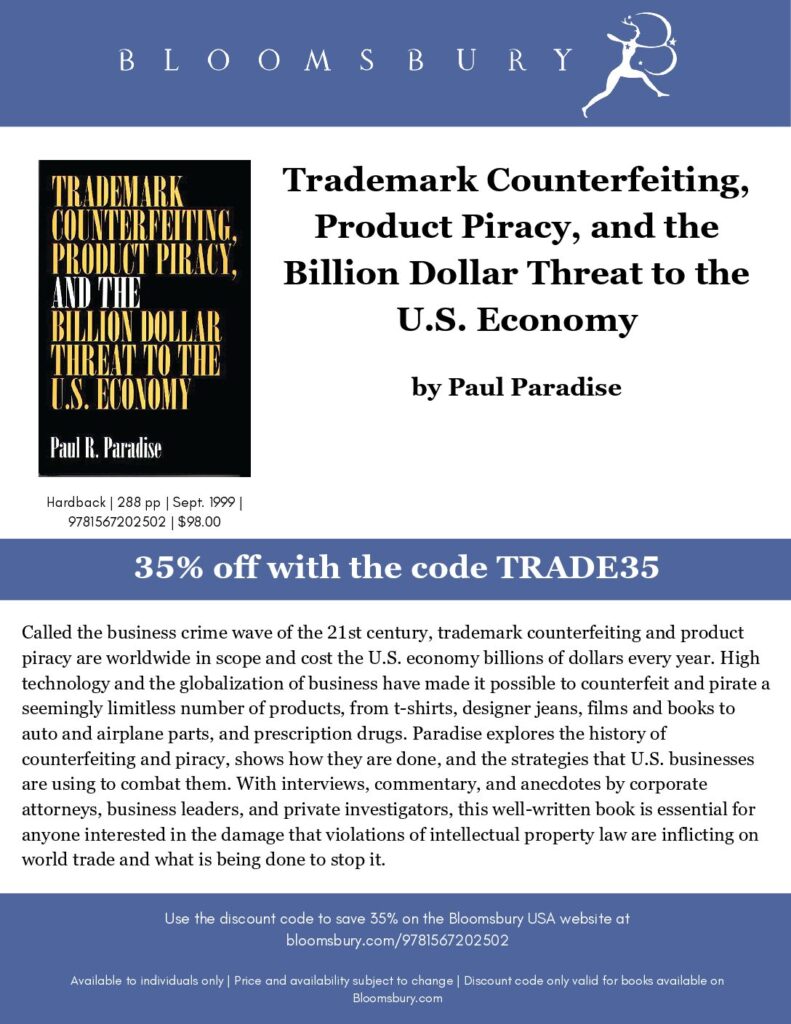APRIL 16TH AND 17TH JAY CONFERENCE CENTER, BRYANT PARK, NYC
TOPIC:
“DOING BUSINESS IN CHINA: THE EFFECT OF 301 TRADE SANCTIONS”
For Attendees:

Author and Lecturer
On January 30, 2023 a Northern Illinois Judge granted Pop Singer Harry Styles a preliminary injunction to stop a list of nearly 200 counterfeiters from selling merchandise that infringe his trademarks. Numerous counterfeit products were being sold on online marketplaces such as Amazon, eBay, Walmart, and Etsy according to the complaint filed on January 10th.
Styles is seeking all of defendants’ profits and triple damages for infringement, as well as $2 million in statutory damages for each use of his marks. Also, in the complaint, lawyers asked for a sweeping takedown of the unauthorized sellers’ items, listing specific URLs and not actual vendors or people, and noted that many of the counterfeit items are from online sellers based mostly in China and “other foreign jurisdictions with lax trademark enforcement system.”
“TRUTH IS ALWAYS CHANGING” FINALIST [Best Investigator Category]
My novel, “Truth Is Always Changing,” was a finalist in the Killer Nashville Claymore awards. I attended the Killer Nashville Mystery Writers Convention the weekend of August 19-21st and attended the awards ceremony held on August 20th.
More evidence of the enormous trade in counterfeit fentanyl emerged during the last week of April, when law enforcement officials, as part of the HIDTA Program, made two large seizures of counterfeit drugs described as ‘the largest fentanyl seizures in Alaska history.’
The High Intensity Drug Trafficking Areas (HIDTA) Program coordinates and assists Federal, State, Local and Tribal law enforcement agencies (LEAs) to address regional drug threats throughout the United States with the purpose of reducing drug trafficking and drug production.
HIDTA Investigators, alerted to a suspicious package at a commercial shipping facility in Anchorage Airport, seized 2,700 counterfeit M30 fentanyl pills addressed to an Alaska residence. The street value was an estimated $100,000.
The next day, the Southeast Alaska Cities Against Drugs taskforce investigators received a tip about a package that was traced to a Klawock residence. Investigators seized 2,000 counterfeit M30 fentanyl pills and 453 grams of crystal methamphetamine. The street value of the counterfeit pills was estimated at around $200,000 and the methamphetamine had an estimated street value of around $67,900.
In a press release about the HIDTA Program:
“In 2022, during the months of January, February, and March the statewide (Alaska High Intensity Drug Trafficking Area) initiative, including the Alaska State Troopers, seized 1,906 pills containing fentanyl and 1,244.42 grams of fentanyl,” the release said. “During all of 2021 the statewide HIDTA initiative, including the Alaska State Troopers, seized 7,310 pills containing fentanyl and approximately 612.16 grams of fentanyl.”
WIPD is a yearly event hosted by the World Intellectual Property Organization.
WIPO is the global forum for intellectual property and is a self-funded agency of the United Nations with 193 member states and was established in 1967. WIPO is headquartered in Geneva, France and not in New York.
This year WIPD marked the first World IP Day Youth Video Competition. More than 36, 819 votes were cast by 33,409 members. Each user was able to cast up to 5 votes.
Watch the videos of the top winners:
I have a short story, “THE RAMBO RIVAL,” published in Mystery Tribune Magazine
The Rambo Rival: Private Eye Flash Fiction By Paul R. Paradise (mysterytribune.com)
Drug enforcement agents arrested more than 800 people and seized 1.8 million counterfeit pills laced with the synthetic opioid fentanyl as part of a two-month crackdown on online sales of the deadly drug. Also seized were 158 weapons, and enough powder fentanyl to make millions of deadly tablets.
The seizures add to the nearly 9.6 million counterfeit pills the DEA has confiscated this year which is more than was seized in the two previous years combined. The number of fake pills found to contain fentanyl rose nearly 430% since 2019.
The fake tablets are mass-produced by Mexican cartels using chemicals from China and sold on social media and e-commerce sites, according to officials who have criticized social media companies for failing to stop the online sale of a growing number of counterfeit pills that look similar to prescription pills.
A black market has developed on the Internet and in chat rooms selling fake vaccine cards. A demand for vaccine cards has developed because employers, concerts and restaurants are requiring them. Vaccine cards are easy to counterfeit and can be shipped through the mail. eBay has removed or blocked 50 million listings.
In July, after a three month investigation, Julie Mazi, a licensed homeopathic health service doctor, was arrested at her office in Napa Valley, Calif. and charged for allegedly issuing fake vaccine cards and prescribing “immunization pellets” to patients that would protect patients from Covid-19.
The fake vaccine cards are sought by people who don’t want to get vaccinated or have put off getting vaccinated and need a card for employment.
Sneaker reselling is an estimated $2 billion business. Getting the sneaker before anyone else is the name of the game and then reselling it on a site like StockX.com. StockX is the leader in the field and is a billion-dollar business.
Nike has brought two suits against two unrelated resellers for trademark infringement in connection with reselling Nike and Converse products that had been altered. One defendant was Customs By Ilene d/b/a Drip Creationz and the other defendant was Jeffrey Waskowiak and his company, KickRich LLC
Jeffrey Waskowiak is a former Nike employee and his company KickRich made footwear products that combined Nike shoe soles with uppers manufactured by Waskowiak but included design elements of Nike.
The altered sneakers were the Air Jordan 1, Air Force 1 and Converse’s Chuck Taylor All Star. The plaintiff’s argument was that in combining non-genuine parts or other brands’ logos the sneakers could no longer be considered Nike or Converse shoes.